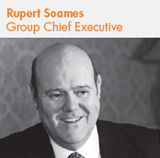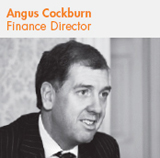Our Strategy
Group Strategy
Our strategy, which was initially developed following an in-depth review of Aggreko's business in 2003, has remained consistent for the last five years and continues to be the basis of our business planning. That strategy is to deliver long-term value to shareholders, excellent service to customers and rewarding careers to our employees by being a leading global provider of temporary power and temperature control. The strong growth in revenues, margins and returns on capital achieved over the last five years indicate that the strategy is the right one, and we continue to work relentlessly to implement it.
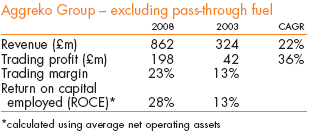
Aggreko's strategy is developed by an iterative process of examining the factors which will affect the business in the years ahead. We seek to develop a deep understanding of the drivers of demand, changing customer requirements, the competitive environment, as well as developments in technology and regulation. We look at our own strengths and weaknesses, and at the opportunities and threats that are likely to face us. From this analysis, we develop a list of investment and operational options, and analyse their relative risks and rewards, bearing in mind the capabilities and resources of the Group.
We test our strategy on a two-year cycle. Having conducted a root-and-branch review in 2003 we re-examined our conclusions in 2005. In 2007, we carried out a thorough review of our markets and service offerings and we updated investors in March 2008 with our latest analysis, the main findings of which are summarised below:
- The strategy developed in 2003 and re-confirmed in 2005 is working well.
- The Group's core markets of power and temperature control rental are growing at a healthy rate, and this gives it plenty of growth opportunities.
- The in-depth analysis made of the drivers of growth in our International Power Projects business indicated that parts of the world are beginning to face serious structural shortages of power which will last many years and which should sustain demand for our services.
- Our Local business also offers attractive opportunities for growth, both from expanding existing territories and developing new ones.
- As a consequence of these conclusions, we believe that it is in shareholders' interests that we continue to invest in the business. The focus of this investment is:
- increasing our revenue-earning capacity, and the choice we can offer to our customers, by increasing the size of our rental fleet;
- improving our ability to serve customers by opening new service centres, both within existing markets and extending our reach into new markets; and
- improving the operational efficiency of our business by investing in training for our employees, improving processes, and extending our use of information technology.
Since the 2007 strategy update, the world macro-economic situation has turned sharply for the worse. This change had no material impact on performance in 2008 but is likely to have a more noticeable effect in 2009, and we will therefore need to be pragmatic and ready to adapt our investment plans in the light of economic events. Our next biennial strategy review will be carried out in 2009, and the results reported to investors in early 2010.
Against the objectives we set ourselves in 2008, good progress was made in the year:
- The Group delivered strong growth in both revenue and earnings in 2008, as shown below:
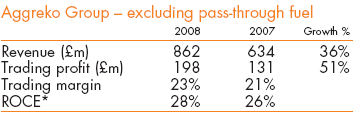
- Total capital expenditure increased in 2008 to a record £265.2 million, £84.6 million up on the prior year, representing 229% of the depreciation charge. £256.4 million was investment in new fleet (2007: £172.4 million).
- In terms of operating efficiency, in 2008:
- revenue per employee increased by 11%; and
- return on average capital employed (ROCE) increased from 26% to 28%.
Note: all ratios relate to revenue and profit excluding pass-through fuel.
- We made good progress extending our global reach:
- We opened our first service centres in South Africa and Russia, and added one in Chile.
- In August we acquired Power Plus Rentals and Sales Ltd in Canada, giving us a strong position in the Athabasca Oil Sands market.
- In November 2008, we announced, and on 1 January 2009 we completed the acquisition of the Cummins power rental business in India.
- There was a major improvement in the scope of our employee development programmes. Siegfried Putzer joined the business as our new Director of HR, we greatly expanded our in-house training facilities in North America and Dubai, and we launched a 1-week tailored programme for senior management delivered by IMD in Lausanne. We also carried out our first global employee opinion survey, which produced outstanding results.
Business line strategy
Supporting the Group strategy, Aggreko has developed operational strategies for our two different lines of business:
- The Local business delivers the complete range of our services, from small generators to large cooling plants, to customers who are typically within a few hours driving time of our service centres;
- The International Power Projects business provides large-scale power generation on a global basis to power utilities, the military and major industrial users.
The Local business
The Local business serves customers from 133 service centres in 31 countries in North, Central and South America, Europe, the Middle East, Asia and Australasia. This is a business with high transaction volumes: average contracts have a value of around £3,000 and last for 2-3 weeks. The Local business, excluding pass-through fuel, represents 67% of Aggreko's revenues and 61% of trading profit.
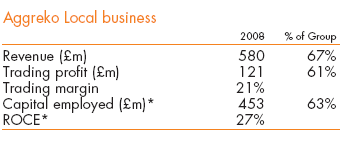
Since 2003, the performance of the Local business has improved sharply:
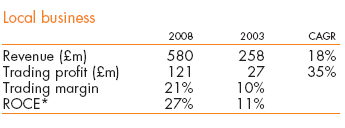
The first objective of our Local business strategy is to create and maintain a clear differentiation between our offering and that of our competitors. Our research shows that Aggreko is regarded by our customers as providing extremely good service, and that we deliver high levels of customer satisfaction. We are determined to maintain this reputation for premium service and we do this through the attitude and expertise of our staff, the geographic reach of our operations, the design, availability and reliability of our equipment, and the ability to respond to our customers 24 hours a day, 7 days a week.
The second objective of our strategy is to be extremely efficient in the way we run our operations. This is essential if we are to provide superior customer service at a competitive price, and at the same time deliver to our shareholders an attractive return on capital. In a business in which lead-times are short, logistics are complex, and we process a large number of low-value transactions, an essential pre-condition of efficiency is having high quality systems and processes.
The operation of our Local businesses in Europe and North America is based on a 'hub-and-spoke' model which has two types of service centre: hubs hold our larger items of equipment as well as providing service and repair facilities; spokes are smaller and act as logistics points from which equipment can be delivered quickly to a customer's site. The hubs and spokes have been organised into areas in which a manager has responsibility for the revenues, profitability and use of capital within that area. In this model, most administrative and call handling functions are carried out in central rental centres.
This operating model is delivering benefits to both our customers and shareholders. For our customers, it means faster and more consistent levels of service and response, and that this is valued is shown in our Net Promoter Scores. This is an objective measure of customer satisfaction which we derive from questioning over 20,000 customers a year. Over the last three years our score has improved by 8pp and, in many of our Local businesses, is now at levels that match or exceed those achieved by companies renowned for delivering high levels of customer satisfaction. For our shareholders, the benefit has been a return on capital employed that has improved from 11% to 27% over the last five years and a compound growth in trading profit of 35% over the same period.
An integral part of the strategy for the Local business is the implementation of our Enterprise Resource Planning (ERP) system which will provide a single, global, IT system for managing our business. The system gives us greatly improved visibility of the business, which will enable us to drive improvements in operating efficiency. The system is fully operational in Europe and North America, and is currently being implemented in Aggreko International. We have now begun the process of delivering the full potential of the ERP system in terms of real-time information and better efficiency through streamlined processes.
International Power Projects
This business serves the requirements of power utilities, governments, armed forces and major industrial users for the temporary provision of large-scale power-generation. Power plants range in size from 10 megawatts (MW) to 100MW on a single site, and the initial contract value will typically be around £1 million, with a duration of 6-9 months although many contracts are subsequently extended beyond this. The business operates in areas where we do not have a large Local business. Most of the customers are power utilities in Africa, the Middle East, Asia and South America. The driver of demand in these markets is that our customers' economies are growing, with consequent increases in demand for additional power which cannot be met in the short-term by installed generating capacity. As a result, many of them face chronic power shortages which damage their ability to support economic growth and increased prosperity. These shortages are often caused or exacerbated by the variability of supply arising from the use of hydro-electric power plants whose output is dependent on rainfall.
International Power Projects now represents 33% of Group revenues and 39% of trading profit excluding pass-through fuel:
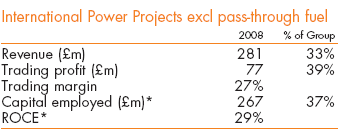
Note: Pass-through fuel refers to revenues we generate from two customers for whom we have agreed to manage the provision of fuel on a 'pass-through' basis. This revenue stream fluctuates with the cost of fuel and the volumes taken, while having little impact on our profitability. We therefore exclude pass-through fuel from most discussions of our business.
Since 2003, the International Power Projects business has also grown rapidly:
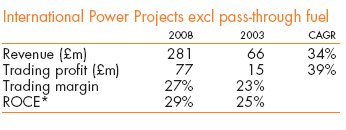
Our strategy for International Power Projects is determined by two key characteristics of the market. The first is that demand can shift rapidly between continents. Six years ago, South America and Sri Lanka were the largest markets, and Africa was only a small proportion of global demand. In 2008, the market in Africa was larger than South America and Sri Lanka combined. It would not surprise us if this situation were to change again in the next three years. These shifts in demand were driven in part by rainfall patterns, in part by the relationship between economic growth and investment in permanent power generation and in part by geo-political issues. To be successful in the long-term, therefore, requires the ability to serve demand globally, and that requires sales, marketing and operational infrastructure to be present in all major markets.
The second observation is that this is a business in which size brings significant advantages. There are numerous reasons for this:
- A large business, with global distribution and a large fleet, which can move assets around the world to meet demand wherever it arises can be reasonably confident when it invests in new equipment that, over its economic life of 8-10 years, the equipment will be on rent for enough of the time to keep in place the operational infrastructure needed to support the equipment, and to earn an economic return on the investment. A business which only operates in a single region or continent will be exposed to significant volatility in demand and, consequently, long periods with idle fleet which will seriously dilute investment returns.
- Each year, a number of 'emergency' requirements arise, often as a consequence of breakdown in permanent generating capacity, for which equipment has to be deployed in a matter of days. These contracts are important because, in many cases, they are the foundation of long-term, valuable customer relationships. To be able to respond to them, however, requires the immediate availability of fleet, and the operational capacity to deploy anywhere in the world. It is much easier to find 30MW of equipment available for immediate mobilisation in a fleet of 3,000MW than in a fleet of 300MW.
- It is our experience that it is possible to run large fleets to higher levels of utilisation than small fleets. This means that large operators can offer better pricing to customers.
- Large operators are able to negotiate better terms with suppliers, and can invest in the design and assembly skills which allow them to deliver equipment optimised to rental requirements at a lower capital cost than is generally available to small-scale operators
In summary, a large operator will have lower volatility of demand, better lifetime utilisation of equipment, be better able to respond to emergency requirements, and will have a lower fleet cost per MW. In International Power Projects, bigger is better - and Aggreko is now much larger than any other competitor in this market, as well as being the only company to have distribution in all the major markets.
Looking Ahead
Our strategy is working well and has produced excellent results. We have strengthened our competitive position in all markets over the last five years, and our global reach is far greater.
In terms of the Local business, we will continue to drive operational improvement, focusing on turning our ERP system into a competitive advantage. We intend to grow our market share in North America, Europe and the Middle East, and we will expand the footprint of our Local business in Eastern Europe, Asia and South America. As well as organic growth, we will also look for opportunities to grow our business through the acquisition of companies or assets in our core markets.
The International Power Projects business has made good progress expanding further in Africa, South America, Asia and the Middle East. Our strategy is to continue to invest heavily in this business to enable it to further increase its scale and reach. This will deliver increasing revenues and profits and will reduce the volatility inherent in the power projects business. A growing proportion of our future investment is likely to be in gas-fuelled generators, which produce lower emissions and which, for some customers, are cheaper to run than diesel generators. We think that this technology could become an important niche in the International Power Projects marketplace in the years ahead.
The current economic crisis will prove challenging in many businesses, Aggreko included. The possible effects of a recession are discussed more fully under the 'What drives market growth?' section in The Market. In short, our global operations combined with the wide range of customer segments in which we operate will help us mitigate the impact in specific regions or sectors by moving equipment either to another sector or to another geography. We believe that the drivers of demand in International Power Projects are strong, and will remain so for as long as demand for power in developing countries is growing faster than these countries can build new permanent power generation capacity. The longer and more severe the global economic slowdown becomes, the greater will be the impact on our business, but the flexibility of our business model which allows us to adjust capital expenditure very quickly is a real strength in the current economic climate.
